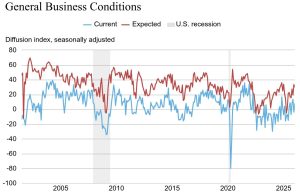An intriguing thing has been happening in Washington, D.C. After years — decades, really — when concerns about the growing federal debt were largely set aside, it has actually become part of the debate. That’s because the budget and tax measures proposed by President Trump and passed by the GOP-led House have set off alarm […]
Already an Subcriber? Log in
Get Instant Access to This Article
Become a Central New York Business Journal subscriber and get immediate access to all of our subscriber-only content and much more.
- Critical Central New York business news and analysis updated daily.
- Immediate access to all subscriber-only content on our website.
- Get a year's worth of the Print Edition of The Central New York Business Journal.
- Special Feature Publications such as the Book of Lists and Revitalize Greater Binghamton, Mohawk Valley, and Syracuse Magazines
Click here to purchase a paywall bypass link for this article.
An intriguing thing has been happening in Washington, D.C. After years — decades, really — when concerns about the growing federal debt were largely set aside, it has actually become part of the debate.
That’s because the budget and tax measures proposed by President Trump and passed by the GOP-led House have set off alarm bells. According to the Congressional Budget Office (CBO) — the analysts charged by Congress with giving members a non-partisan breakdown of the fiscal and economic impact of proposed legislation — the bill that got sent over to the Senate would add $2.3 trillion to a national debt of more than $36 trillion, which already has the federal government spending more on interest payments each year than on defense. And budget experts believe that if the House version becomes law, the debt could surpass 117 percent of our gross domestic product (GDP) by 2034, putting us in uncharted territory.
But I don’t think that’s the only reason people both inside and beyond the Beltway have been paying attention. Because while Washington debates the bill, the international financial markets have been sending warning signals. In particular, with a rise in bond yields — that is, the cost we taxpayers have to pay in order to get investors interested in actually forking over money to help us pay for the bonds that fuel our tax cuts and spending — they appear to be signaling doubts about the worthiness of what used to be considered the world’s safest asset.
And this is where we get to Capitol Hill and politics. Because the big question is why these concerns have surfaced now. As the Wall Street Journal’s Spencer Jakab wrote recently, “Sounding the alarm about a debt crisis has been great [in the past] for companies shilling gold coins and fishy financial products, but it has made smart, sincere people look silly when nothing happened.” Now, however, lots of people—including onetime Trump ally Elon Musk — are focused on a potential debt crisis.
That brings us back to the budget and tax bill. One thing that seems clear from growing unease within the financial world — the Moody’s downgrade of the U.S. credit rating, the quivers in the bond market, the falling value of the U.S. dollar — is that the world is losing faith in U.S. political leadership, including Congress. As the economist and writer Paul Krugman wrote recently, “We certainly have the resources to honor our debts. But do we have the political will? Maybe even more important, do we have the political seriousness?”
I’m not going to get into the politics swirling around the bill as it makes its way through the Senate right now. But it is definitely worth pointing out that a problem of this duration, severity, and complexity needs a bipartisan approach, and we’re not seeing that.
Instead, Congress has backed off its responsibilities. The debate is being fed by individual members of Congress, along with the press and independent analysts who’ve taken a cold, hard look at the measure. It’s not the result of any serious effort on Capitol Hill to analyze the bill in detail and lay out its expected impact on the economy.
This is not a new problem. Back in 2017, I wrote the following: “Regardless of what our political leaders say about deficits and debt, their actions tend to belie their words: they continue expensive federal programs and lavish tax breaks on favored constituencies without regard to the long-term fiscal impact. I’ve come to believe that deficits will likely continue — with increasing debt — until some financial crisis occurs. There is little real seriousness about trying to solve our fiscal issues, or real appetite to get our spending under control and use taxes to get a handle on our finances.” I wish I could say things have changed, but they haven’t.
Lee Hamilton, 94, is a senior advisor for the Indiana University (IU) Center on Representative Government, distinguished scholar at the IU Hamilton Lugar School of Global and International Studies, and professor of practice at the IU O’Neill School of Public and Environmental Affairs. Hamilton, a Democrat, was a member of the U.S. House of Representatives for 34 years (1965-1999), representing a district in south-central Indiana.
Lee Hamilton, 94, is a senior advisor for the Indiana University (IU) Center on Representative Government, distinguished scholar at the IU Hamilton Lugar School of Global and International Studies, and professor of practice at the IU O’Neill School of Public and Environmental Affairs. Hamilton, a Democrat, was a member of the U.S. House of Representatives for 34 years (1965-1999), representing a district in south-central Indiana.



